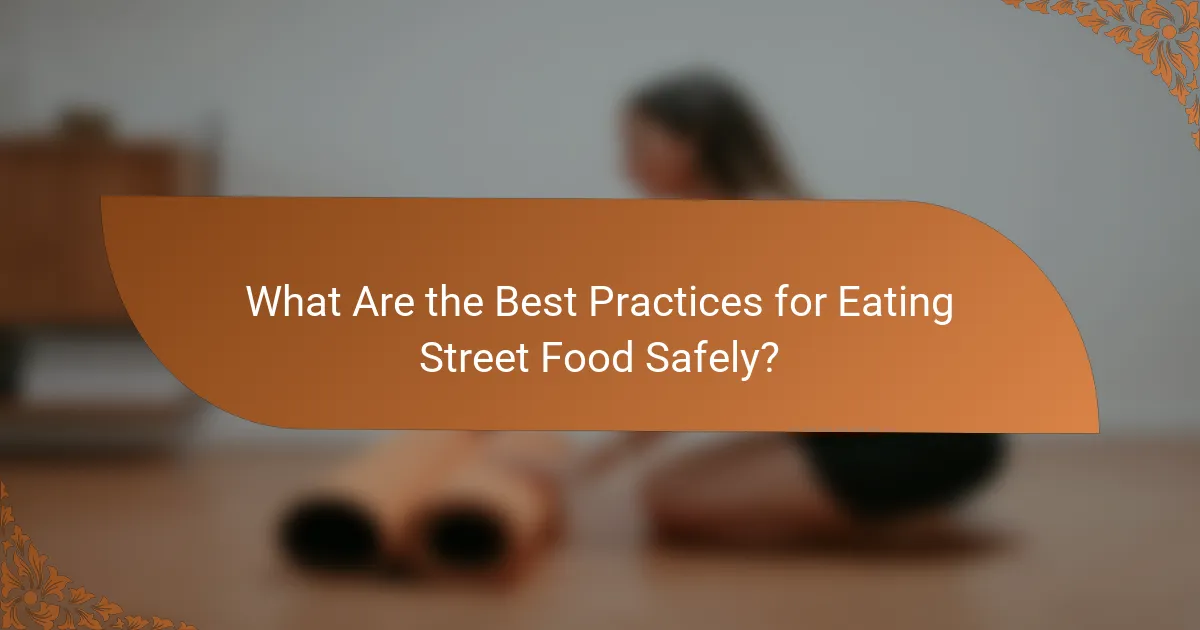For those with food allergies, finding safe and enjoyable street food can be a challenge, but there are plenty of allergy-friendly options available. From gluten-free tacos to dairy-free ice cream, these choices cater to various dietary restrictions while ensuring a delicious experience. It’s essential to identify vendors who prioritize allergen information and maintain clean preparation practices to guarantee safety for sensitive eaters.

What Allergy-Friendly Street Food Options Are Available?
Allergy-friendly street food options cater to individuals with specific dietary restrictions, ensuring safe and enjoyable eating experiences. Popular choices include gluten-free tacos, vegan falafel, nut-free sandwiches, dairy-free ice cream, and egg-free wraps, each designed to accommodate various sensitivities.
Gluten-Free Tacos
Gluten-free tacos are a delicious option for those with celiac disease or gluten intolerance. Many vendors offer corn tortillas, which are naturally gluten-free, filled with a variety of ingredients such as grilled meats, beans, and fresh vegetables.
When selecting gluten-free tacos, confirm that all toppings and sauces are free from gluten-containing ingredients. Look for vendors that specialize in gluten-free options to minimize cross-contamination risks.
Vegan Falafel
Vegan falafel is a popular street food that is both plant-based and typically free from common allergens like dairy and eggs. Made from ground chickpeas and spices, falafel is often served in pita bread or as part of a salad.
Ensure that the falafel is fried in oil that has not been used for cooking non-vegan items to avoid cross-contact. Many vendors offer tahini or hummus as a dip, which are usually safe for vegan diets.
Nut-Free Sandwiches
Nut-free sandwiches are essential for individuals with nut allergies. Many street food vendors provide a variety of sandwich options using bread, meats, and vegetables that do not contain nuts.
Always check the ingredient list and ask about preparation methods to avoid cross-contamination. Opt for vendors that clearly label their food as nut-free to ensure safety.
Dairy-Free Ice Cream
Dairy-free ice cream is a refreshing treat for those with lactose intolerance or dairy allergies. Made from alternatives like almond milk, coconut milk, or soy milk, these ice creams come in various flavors.
When choosing dairy-free ice cream, verify that it is produced in a facility that does not process dairy products to prevent cross-contamination. Many vendors offer clearly marked dairy-free options to help you make safe choices.
Egg-Free Wraps
Egg-free wraps are suitable for individuals with egg allergies and are often made from alternative ingredients such as rice flour or corn. These wraps can be filled with a variety of fillings, including vegetables and proteins.
Check with vendors to ensure that the wraps do not contain egg-based ingredients and are prepared separately from egg-containing foods. Look for establishments that specialize in allergy-friendly options for added peace of mind.

How to Identify Safe Street Food Vendors?
Identifying safe street food vendors is crucial for those with food allergies. Look for vendors who provide clear allergen information, maintain clean preparation areas, and are knowledgeable about their ingredients.
Check for Allergen Information
Vendors should display allergen information prominently, either on their menus or through signage. This includes common allergens like nuts, dairy, gluten, and shellfish. If the information is not available, consider it a red flag.
Some vendors may offer allergen-free options, so inquire about specific dishes that cater to your dietary needs. Always confirm that the vendor can provide detailed ingredient lists upon request.
Ask About Cross-Contamination
Cross-contamination is a significant concern for those with allergies. Always ask vendors how they prevent cross-contact between allergenic and non-allergenic foods. This may include separate cooking utensils, dedicated frying oil, or designated preparation areas.
Be cautious if a vendor cannot provide clear answers or if they prepare multiple types of food in the same space. A lack of awareness about cross-contamination practices can lead to serious allergic reactions.
Look for Certification Labels
Certification labels can indicate that a vendor adheres to specific food safety standards. Look for labels from recognized organizations that certify allergen-free practices or safe food handling. These certifications can provide an extra layer of assurance.
In some regions, local health departments may offer food safety ratings that can be checked online or displayed at the vendor’s location. Always consider these ratings when choosing where to eat.

What Ingredients Should Sensitive Eaters Avoid?
Sensitive eaters should avoid ingredients that commonly trigger allergic reactions, such as nuts, dairy, and gluten. Understanding these ingredients is crucial for making safe choices when selecting street food.
Common Allergens: Nuts, Dairy, Gluten
Nuts, dairy, and gluten are among the most prevalent allergens that sensitive eaters need to be cautious about. Nuts can be found in many snacks and desserts, while dairy is often present in sauces, breads, and fried foods. Gluten, found in wheat and related grains, is a common ingredient in many street food items, including wraps and pastries.
When choosing street food, always inquire about the presence of these allergens. Many vendors may offer alternatives, such as gluten-free bread or dairy-free sauces, which can help accommodate dietary restrictions.
Hidden Ingredients in Sauces
Many sauces used in street food can contain hidden allergens that are not immediately obvious. For instance, sauces may include dairy products like cream or cheese, or they may be thickened with gluten-containing ingredients. It’s essential to ask vendors about the ingredients in their sauces to avoid unexpected reactions.
Look for simple sauces made from fresh ingredients, as these are less likely to contain hidden allergens. If in doubt, request sauces on the side or choose dishes that are served without sauce to minimize risk.
Potential Cross-Contaminants
Cross-contamination is a significant concern for sensitive eaters, especially in busy street food environments. Shared cooking equipment, utensils, and surfaces can lead to the unintentional mixing of allergens with safe foods. For example, a grill used for both gluten-containing and gluten-free items may pose a risk.
To reduce the risk of cross-contamination, choose vendors who are aware of food allergies and can prepare your meal separately. Observing how food is prepared can also provide insight into their practices regarding allergen safety.

How to Communicate Allergies to Street Food Vendors?
Effectively communicating allergies to street food vendors is crucial for ensuring safe dining experiences. Clear communication helps vendors understand your needs and reduces the risk of allergic reactions.
Use Clear and Direct Language
When speaking with street food vendors, use straightforward language to convey your allergies. Avoid jargon or vague terms; instead, clearly state what you cannot eat. For example, say “I am allergic to peanuts” rather than “I have a nut allergy.”
Being direct helps eliminate misunderstandings. If possible, practice your message beforehand to ensure clarity and confidence when ordering.
Provide a List of Allergens
Prepare a concise list of your allergens to share with the vendor. This list should include all relevant items, such as gluten, dairy, shellfish, or specific nuts. Providing this information helps the vendor identify safe options quickly.
Consider carrying a small card that lists your allergies in the local language, especially when traveling. This can facilitate communication and ensure that your dietary restrictions are understood.
Request Specific Preparation Methods
To further ensure your safety, request specific preparation methods that minimize cross-contamination. Ask for your food to be cooked on a clean grill or in a separate pan, and specify that utensils should not have come into contact with your allergens.
For example, you might say, “Please use a clean pan for my order to avoid any gluten contamination.” This proactive approach can significantly reduce the risk of allergic reactions while enjoying street food.

What Are the Best Practices for Eating Street Food Safely?
To eat street food safely, prioritize vendors who maintain high hygiene standards and offer fresh ingredients. Being mindful of your food choices and preparation methods can significantly reduce the risk of allergic reactions and foodborne illnesses.
Choose Busy Vendors
Selecting busy street food vendors is a practical strategy for ensuring food safety. High customer turnover often indicates that the food is freshly prepared and that the vendor adheres to good hygiene practices to maintain their reputation.
Observe the vendor’s food handling and preparation methods. Look for clean workspaces, proper food storage, and staff wearing gloves or hairnets. If a vendor is popular, it’s likely that they have repeat customers who trust their food quality.
Additionally, consider the type of cuisine offered. Vendors specializing in specific dishes may have a better understanding of safe preparation techniques, which can be crucial for sensitive eaters. Always ask about ingredients and preparation methods to ensure they align with your dietary needs.
